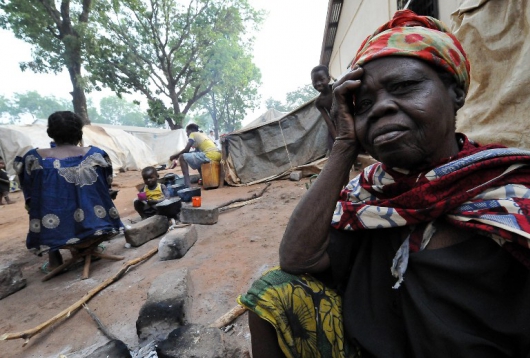1.6 Million People Urgently Need Food In The Central African Republic
By Countercurrents
8 April, 2014
Countercurrents.org

Displacement of families is affecting nutrition and employment
In the Central African Republic (CAR), overall, 1.6 million people are in need of urgent food assistance. As of late March, some 625 000 individuals were displaced due to conflict in the country. Unprecedented crisis in the country is devastating the economy and people's ability to secure basic necessities. An assessment report by the Food and Agriculture Organization (FAO) and the World Food Programme (WFP) paint a grim picture.
The number of people now in need of urgent food is more than double the level estimated just over a year ago, in February 2013, said the report.
However, as of March 2014, only about one-third of the required funding is secured, necessitating incomplete food baskets and half ration distributions.
The two UN agencies in their report released this week warned that the country needed a long and expensive humanitarian operation over at least the next 18 months to stem the growing toll, and pave the way to rebuild livelihoods.
The UN agencies issued the report as they took action to help displaced and other conflict-affected families gain immediate access to food and cash while also preparing for a crucial planting season, which will help families produce food and income for the long term.
The report said widespread conflict since December 2012 has caused the destruction of livelihoods, loss of food and cash crops, livestock and crucial productive assets across the country.
The report (“Special Report, FAO/WFP Markets and Food Security Assessment Mission to the Central African Republic ”, April 7, 2014) said:
1. The country's vital agricultural sector contracted by nearly 37 percent in 2013 and business-persons once managing most of the trade and transport activities have left the country. Agriculture, the backbone of the economy providing some 57 percent of GDP, was the hardest-hit of all sectors. This, coupled with a shortage of adequate vehicles, is severely affecting internal commerce, the availability of food and the import-export market.
2. Prices of most agricultural commodities are currently lower than their pre-crisis levels due to a depressed local demand which more than compensated for the sharply reduced supply. By contrast, prices of meat and fish are well above their levels of early 2013.
3. In 2013 the GDP of the country was 28.3 percent less than in 2012.
4. Imports from neighboring countries declined by 25.7 percent in 2013 and the movement of locally produced food commodities from surplus producing areas to deficit areas was severely restricted.
5. Commerce and transport sectors are currently a fraction of their pre-crisis levels. The onset of the rainy season is expected to disrupt the already inadequate road transportation network, limiting the window of opportunity for humanitarian interventions. Pre-positioning of agricultural inputs and food stocks is also becoming a huge challenge.
6. Prospects for the 2014 cropping season, beginning from March/April, are grim given the level of insecurity and lack of agricultural inputs.
A humanitarian system-wide Level 3 emergency response, whose immediate objective is saving lives and protecting livelihoods, was declared on December 11, 2013 in CAR.
Since early 2013, the people of the country have been facing serious challenges in accessing food due to reduced supplies, trade disruption and loss of purchasing power. Unemployment is rampant in all sectors, both formal and informal, and civil servants have not been paid for several months. Unprecedented civil conflict and insecurity have severely affected economic activity and devastated livelihoods in the African country.
There has been a drastic loss of dietary diversity, and a sharply reduced intake of animal proteins, which raises serious concerns for family nutrition and health, especially among children.
"First and foremost, we need to see violence stop. At the same time, we need to help save lives and rebuild livelihoods," said Arif Husain, Chief Economist at WFP.
The rainy season from this month poses a severe challenge to the already inadequate road network, threatening to make many places inaccessible by road and hindering pre-positioning of food stocks and agricultural inputs.
FAO's two-pronged approach to improve food security in the CAR includes providing essential agricultural inputs such as seeds and tools to about 75 000 households in time for the planting period starting in April, and a comprehensive plan to help over 400 farmer groups and women's associations recover their livelihoods and build resilience.
WFP is assisting 1.25 million women, children and men in the country. The UN agency provides food assistance to internally displaced people, nutrition support to malnourished children, pregnant women, nursing mothers and individuals with HIV/AIDS and emergency school meals for children.
But due to fund shortage vulnerable and displaced people were receiving half-rations with fewer types of food.
So far, FAO has distributed 12.5 tonnes of seeds. The UN agency is planning to distribute about 1 800 tonnes of seeds in mid-April to nearly 76 000 households. WFP plans to distribute food rations to the same beneficiaries to reduce the risk that vulnerable families will consume seeds for food or feed instead of planting them.
The 2014 lean season started at least two months earlier, exacerbating the strain on coping mechanisms of vulnerable groups.
Comments are moderated
